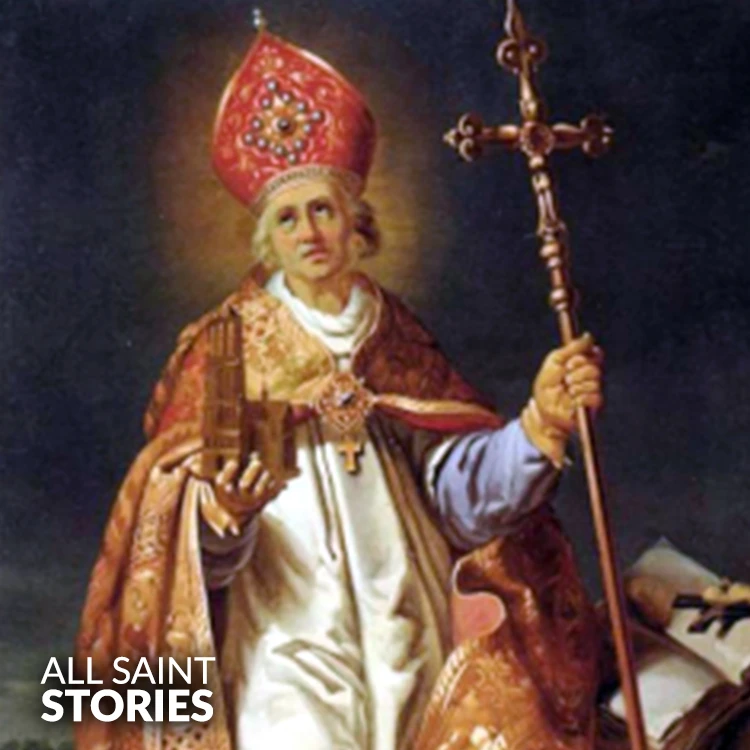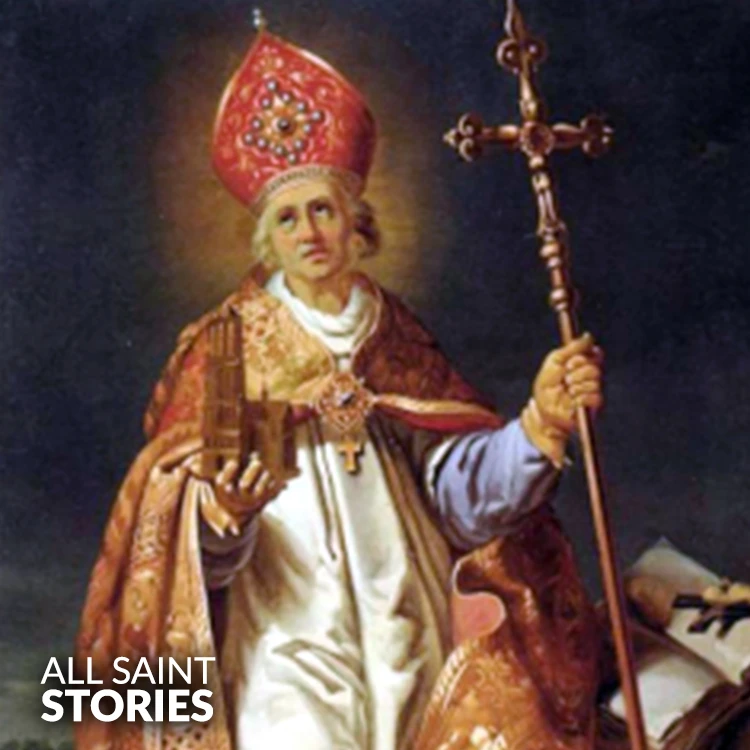"Saint Willibrord, faithful servant of God, who dedicated your life to spreading the Gospel and serving others, intercede for us. Strengthen our faith, guide us in our efforts to live with compassion and love, and help us remain steadfast in our devotion to God. Through your prayers, may we grow closer to Christ and carry His light into the world. Amen."
ST. WILLIBROD (BISHOP)
ST. WILLIBROD (BISHOP)

St. Willibrord was an Anglo-Saxon missionary bishop who played a vital role in spreading Christianity in the Netherlands, Luxembourg, and parts of modern-day Germany. Known as the "Apostle to the Frisians," he became the first Bishop of Utrecht and founded the Abbey of Echternach, where he was later buried.
St. Willibrord was born on November 6, 658, in Northumbria, England. He was raised in a deeply Christian family and, from a young age, showed strong signs of religious devotion. At the age of seven, he was sent to the Abbey of Ripon, where he studied under St. Wilfrid, a well-known bishop and missionary. This early formation would set the foundation for his entire life of service to the Church.
As a young man, Willibrord left England to pursue advanced religious studies in Ireland, which at the time was a renowned center of monastic learning and missionary training. He studied at the abbey of Rath Melsigi, a hub for Anglo-Saxon and Irish monasticism. He spent twelve years in Ireland, growing in wisdom, holiness, and leadership.
In 690, at the age of 32, Willibrord felt called to missionary work. He left Ireland with eleven companions and traveled to Frisia (modern-day Netherlands), which was still largely pagan. His goal was to bring the Gospel to the people of the Low Countries, an area that had resisted earlier efforts of Christianization.
Willibrord’s mission was backed by Pepin of Herstal, the Frankish ruler who had political control over parts of the region. With this support, Willibrord gained access to Frisian lands and began preaching, baptizing, and establishing Christian communities. His efforts met with resistance at times, especially from those loyal to pagan traditions, but his patience and gentleness helped win many converts.
In 695, Willibrord traveled to Rome and was consecrated as a bishop by Pope Sergius I. He was given the title "Archbishop of the Frisians" and returned to continue his mission. He chose Utrecht as his ecclesiastical center and became the first Bishop of Utrecht, laying the foundation for what would become a vital diocese in Northern Europe.
Throughout his life, Willibrord tirelessly founded churches, monasteries, and schools. One of his most important legacies was the founding of Echternach Abbey in Luxembourg around the year 698. This abbey would become a spiritual and cultural center for centuries, preserving learning and promoting Christian life in the region.
Willibrord was known not only for his missionary zeal but also for his deep humility and peaceful spirit. He remained close to his monastic roots, often spending time in prayer and contemplation, even while actively engaging in pastoral work and evangelization.
Despite occasional setbacks and opposition—particularly from Radbod, the pagan king of Frisia—Willibrord never lost hope. He believed in conversion through love, not force, and often adapted to local customs to build trust and understanding among the people.
He continued his mission work into old age and passed away peacefully on November 7, 739, at the Abbey of Echternach, where he had retired in his later years. He was 81 years old at the time of his death and was buried in the very abbey he founded.
Following his death, Willibrord was immediately venerated as a saint. Pilgrims visited his tomb, and his life inspired generations of missionaries across Europe. While he was never formally canonized in the modern sense, his cultus was recognized by the universal Church, and his feast day, November 7, is still observed today, particularly in the Netherlands, Luxembourg, and parts of Germany and England.
Video Not Found
The information on this website is compiled from various trusted sources. While we aim for accuracy, some details may be incomplete or contain discrepancies.
If you notice any errors or have additional information about this saint, please use the form on the left to share your suggestions. Your input helps us improve and maintain reliable content for everyone.
All submissions are reviewed carefully, and your personal details will remain confidential. Thank you for contributing to the accuracy and value of this resource.
Credits & Acknowledgments
- Anudina Visudhar (Malayalam) – Life of Saints for Everyday
by Msgr. Thomas Moothedan, M.A., D.D. - Saint Companions for Each Day
by A. J. M. Mausolfe & J. K. Mausolfe - US Catholic (Faith in Real Life) – Informational articles
- Wikipedia – General reference content and images
- Anastpaul.com – Saint images and reflections
- Pravachaka Sabdam (Malayalam) – Saint-related content and insights
We sincerely thank these authors and platforms for their valuable contributions. If we have unintentionally missed any attribution, please notify us, and we will make the correction promptly.
If you have any suggestion about ST. WILLIBROD (BISHOP)
Your suggestion will help improve the information about this saint. Your details will not be disclosed anywhere.
© 2025 Copyright @ www.allsaintstories.com



 English
English
 Italian
Italian
 French
French
 Spanish
Spanish
 Malayalam
Malayalam
 Russian
Russian
 Korean
Korean
 Sinhala
Sinhala
 Japanese
Japanese
 Arabic
Arabic
 Portuguese
Portuguese
 Bantu
Bantu
 Greek
Greek
 German
German
 Dutch
Dutch
 Filipino
Filipino